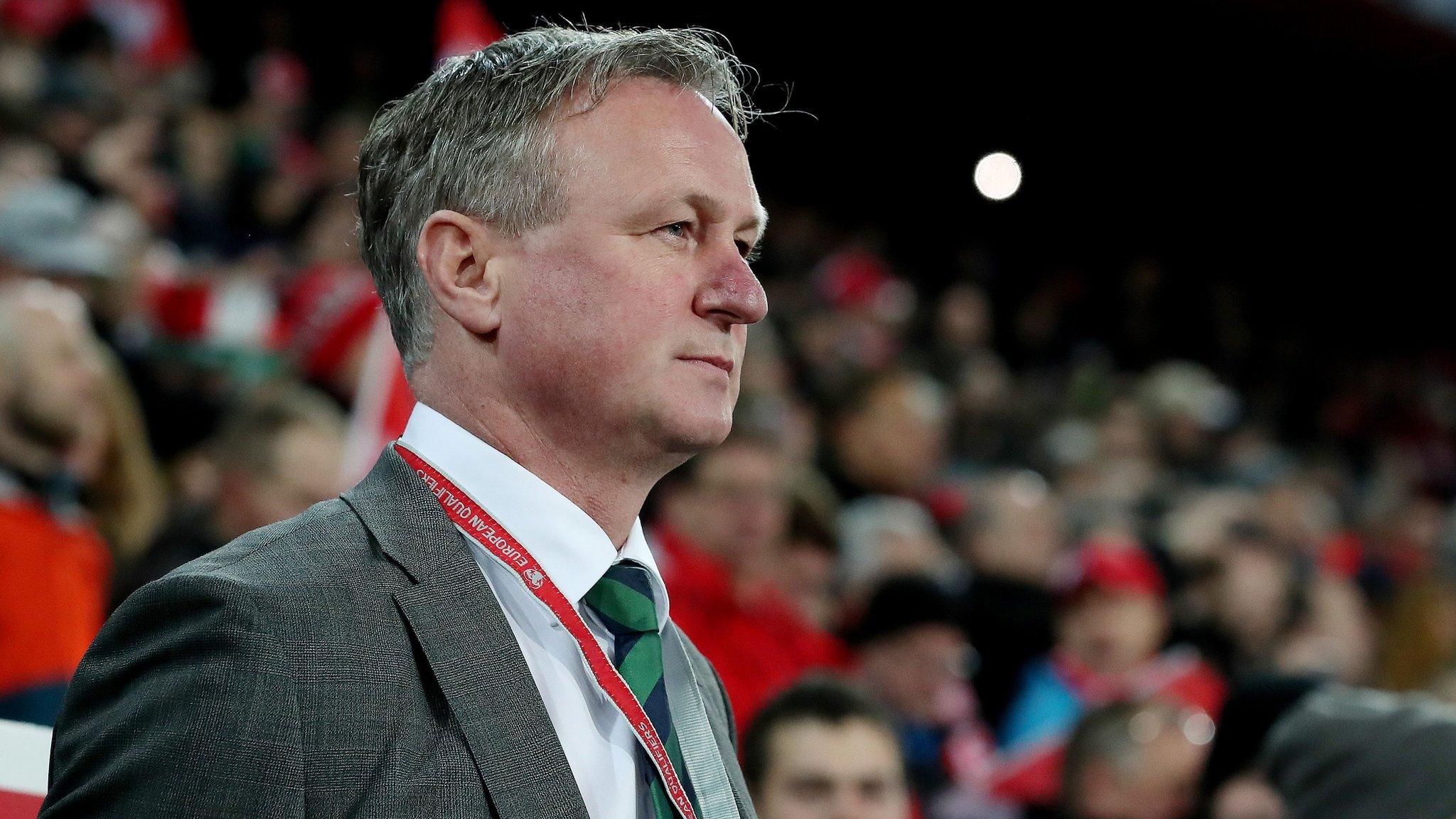Michael O'Neill: Can Scotland prise manager away from Northern Ireland?
- Published
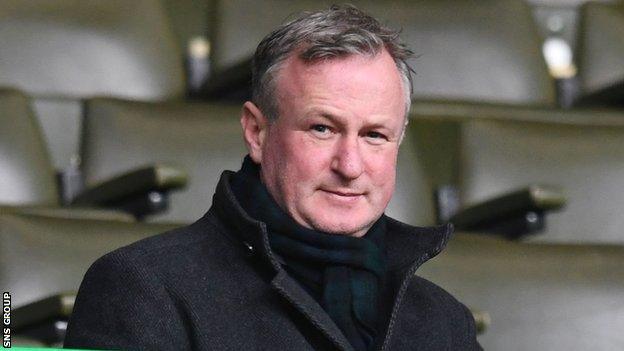
Edinburgh-based Michael O'Neill is a frequent visitor to Scottish Premiership matches
In cataloguing the Scottish FA's pursuit of Michael O'Neill, it's probably worth reminding ourselves why they made the Northern Ireland manager their number one choice in the first place.
There's Northern Ireland's rise in Fifa world rankings from 129th early in his reign to their current position of 24th.
There's the fact that Northern Ireland began Euro 2016 qualifying as fifth seed in their pool and ended up winning their group.
There's the memory of them making the last 16 at the Euros, an achievement that brought in over £10m into the Irish Football Association coffers.
Maybe the best place to start, though, is at the end. Northern Ireland's last match under O'Neill was against Switzerland in Basel on 12 November. It was the second leg of the World Cup play-offs. They'd made the knockout round with two games to spare in their section.
They went to Basel trailing 1-0. The goal that settled the match in Belfast was courtesy of the most ludicrously awarded penalty you could ever see. It was a catastrophically bad decision by the officials that put Northern Ireland on the back foot against a vastly experienced team.
Switzerland were ranked 11th in the world at the time. In their qualifying group they'd finished level on points with Portugal, only losing out on first place, and automatic qualification, on goal difference. They had won nine competitive games in a row at home, a run stretching back three years.
In their starting line-up against O'Neill's team they had players from Serie A, La Liga, the Bundesliga, the English Premier League and Portugal's Primeira Liga. The fourteen players O'Neill used on the night were taken from the English Premier League (four), the English Championship (seven), the Scottish Premiership (two) and the other, Josh Magennis, from Charlton in English League One.
The game ended 0-0; a highly credible draw, but also the end of the World Cup dream for O'Neill's team.
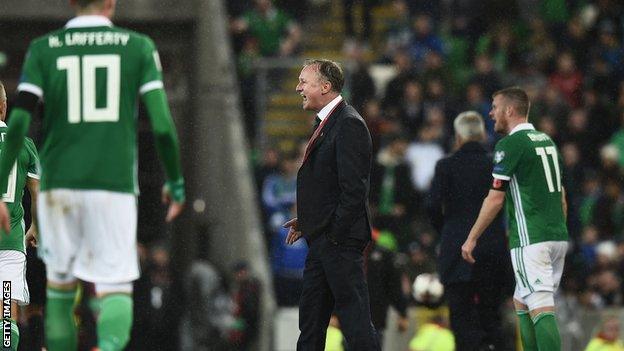
O'Neill's team could not find a way past Switzerland in the play-off second leg
That same night the speculation started that O'Neill may have managed his country for the last time. And the speculation hasn't stopped. Sunderland and West Bromwich Albion both spoke to him when they were looking for a manager. When Mark Hughes was sacked by Stoke, O'Neill was the first man to be installed as favourite, now overtaken in the betting by his countryman, and namesake, Martin.
Much to the relief of the SFA's chief executive, Stewart Regan, the Sunderland and West Brom interest came and went and it looks like that's going to be the case with Stoke as well. They want a man with proven experience of England's Premier League and, for all his strengths, Michael O'Neill doesn't have that.
That's a blessing for Regan. From the get-go, he has wanted O'Neill as Gordon Strachan's replacement. His challenge was persuading his board at Hampden that his target was worth the amount of money that it would cost to get him. It's been a hard road.
Since the turn of the year, the reporting of this saga has veered one way and then the other. On 5 January, there were stories about the SFA closing in on O'Neill. On 6 January, O'Neill was supposedly ready to snub them. On 7 January, the SFA was said to be not abandoning hope. On 8 January, O'Neill was the bookies' favourite to go to Stoke. On 10 January, the SFA said in a statement to fans that it was making progress on an appointment.
Regan is playing the straightest of straight bats to any request for information. On the record, and off, he is saying that he will not divulge anything about confidential business.
What we know is that O'Neill's employers at the IFA believe that he can walk on water and, as such, they have made him the kind of offer that befits his status as a footballing deity.
He has two years to serve on his current contract - with a salary of about £500,000 - and they have offered him another four years on top of that - with his salary rising to around £700,000, maybe a fraction more.
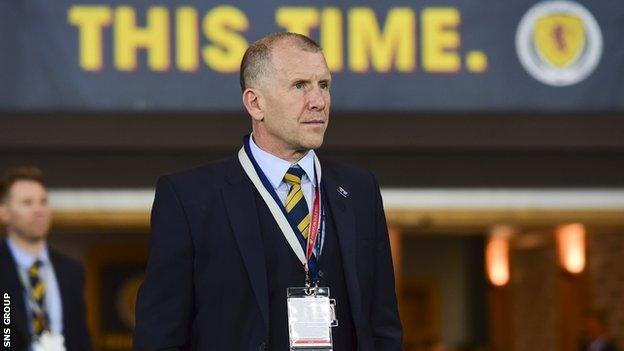
Scottish FA chief executive Stewart Regan has made O'Neill his number one target
It's any eye-watering offer with massive job security - and it's not one the SFA can match, pound-for-pound or year-for-year. Regan might not be saying anything, but he's been working hard to try to put together something attractive.
Regan has not spoken to O'Neill, but he has spoken to people close to him. He knows the numbers involved and is trying to walk a line that sees him offering as much cash and security to tempt O'Neill - it still won't match the IFA's offer - but not too much as to spook the SFA board.
It's suggested that the package that may be put on the table would make O'Neill the highest paid Scotland manager in history.
There's a complication, of course. Regan can't make that offer formal until he talks to O'Neill about a raft of financial and footballing issues. And he can't talk to O'Neill until he agrees to come up with about £500,000 in compensation for the IFA.
He's only going to do that if the mood music from O'Neill's camp gives him the encouragement to do so.
Michael O'Neill fact-file |
|---|
Born: 5 July 1969 |
Began career with Coleraine in Irish League, before joining Newcastle United |
Played as a midfielder and forward during a 20-year playing career |
Among the clubs he played for were Dundee United, Hibernian, Coventry City, Wigan Athletic and St Johnstone |
Made 31 appearances for Northern Ireland, scoring four goals |
Was in charge of Brechin City and Shamrock Rovers before being appointed Northern Ireland boss in December 2011 |
No doubt, there are people telling him that he stay with Northern Ireland, that his work there isn't yet done, that accepting the financial riches and length of contract and unconditional love of his own people is the smart play.
His many supporters could understand him leaving if it was for a Premier League club or an ambitious Championship outfit, but for the serial failures of Scotland?
The counter-argument - and he's heard plenty of this as well - is that he has taken Northern Ireland as far as they can go, that he's worked miracles in achieving what he has with such a shallow pool of players but that the miracles can't keep happening.
There's very little talent coming through and very little reason to believe that another bid for a major championship is realistic. Does O'Neill really see himself trying to conjure up results on diminishing resources for six more years?
The unused back-up from the bench against Switzerland in that second leg play-off in November illustrates a point. It consisted of Kyle Lafferty of Hearts, Paul Paton of St Johnstone, Alan Mannus, a reserve at St Johnstone, Lee Hodson, who's more out than in at Rangers, Shane Ferguson and Conor McLaughlin of Millwall, Matthew Lund of Burton Albion, Rory McArdle of Scunthorpe and the 40-year-old Roy Carroll of Linfield.
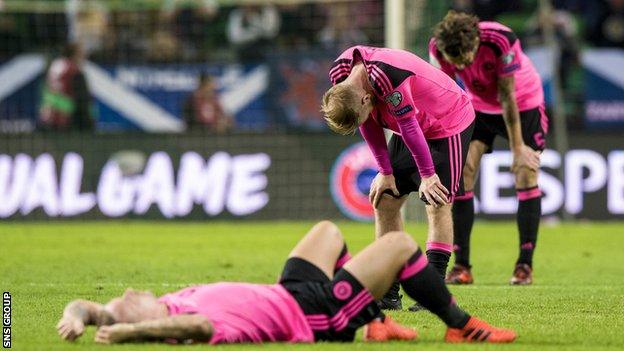
Scotland, who have not been to a major finals since 1998, finished third in their World Cup qualifying group
What's surprising is that given the wonders he has achieved with Northern Ireland, O'Neill still doesn't appear to have had an appealing offer from a well-placed club. His agent might want to ponder that one for a minute. As it stands, it's Northern Ireland or Scotland.
The case for Scotland? A bold challenge, a new test. More players than Northern Ireland. More players playing at a higher level. More Champions League players, more English Premier League players, more Championship players, more young players, better facilities, more fans, more opportunity to succeed.
Scotland will, sooner or later, qualify for a major tournament again. Whoever finally takes them there had better be prepared for hero worship on a scale they may never have witnessed before.
O'Neill has made it known that he wants to decide on his future plans by the end of January. It looks as if Regan will have his ducks in a row before then. The chief executive and the man he admires so much need to talk - and talk soon.
- Published8 January 2018
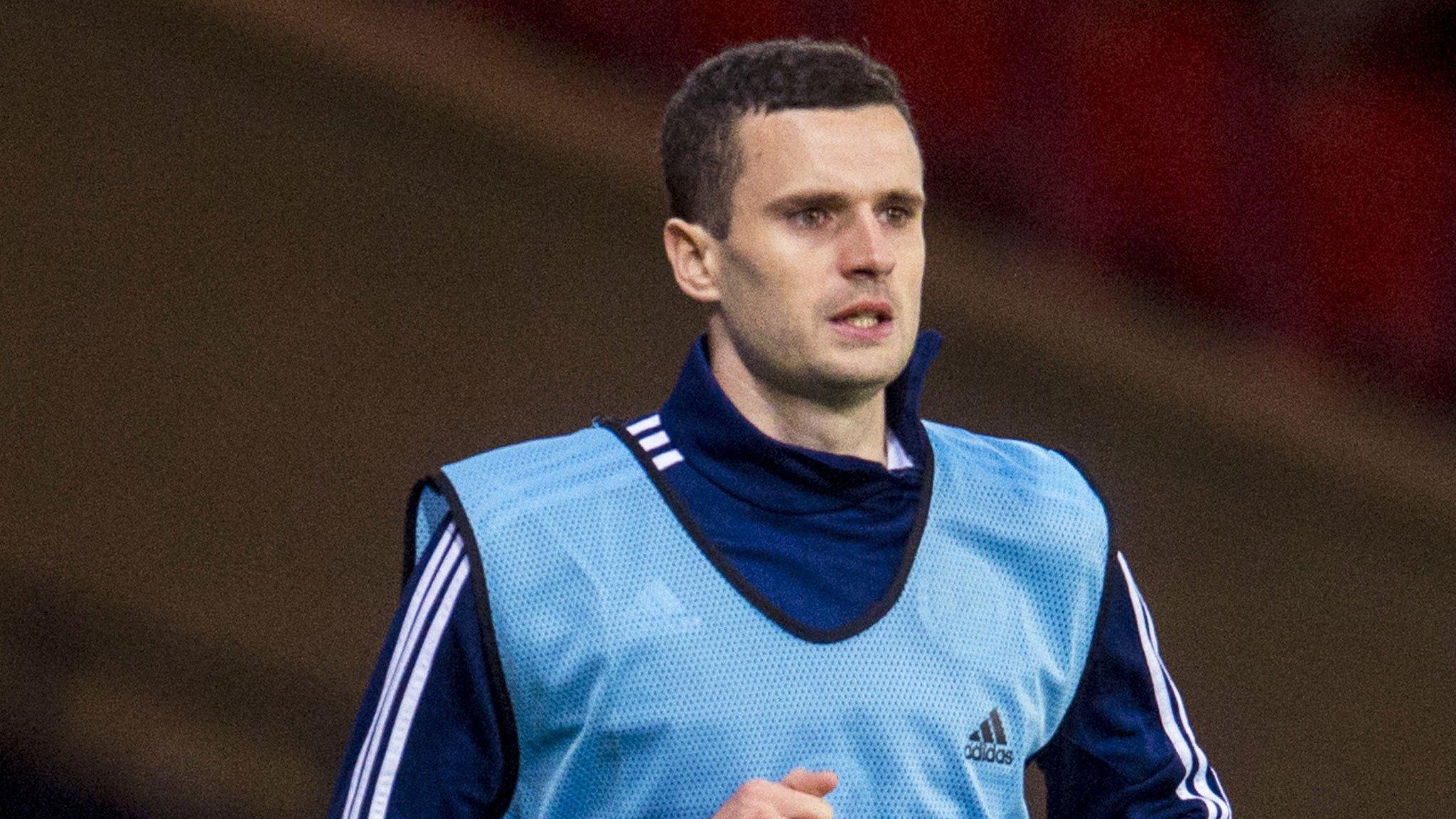
- Published7 January 2018
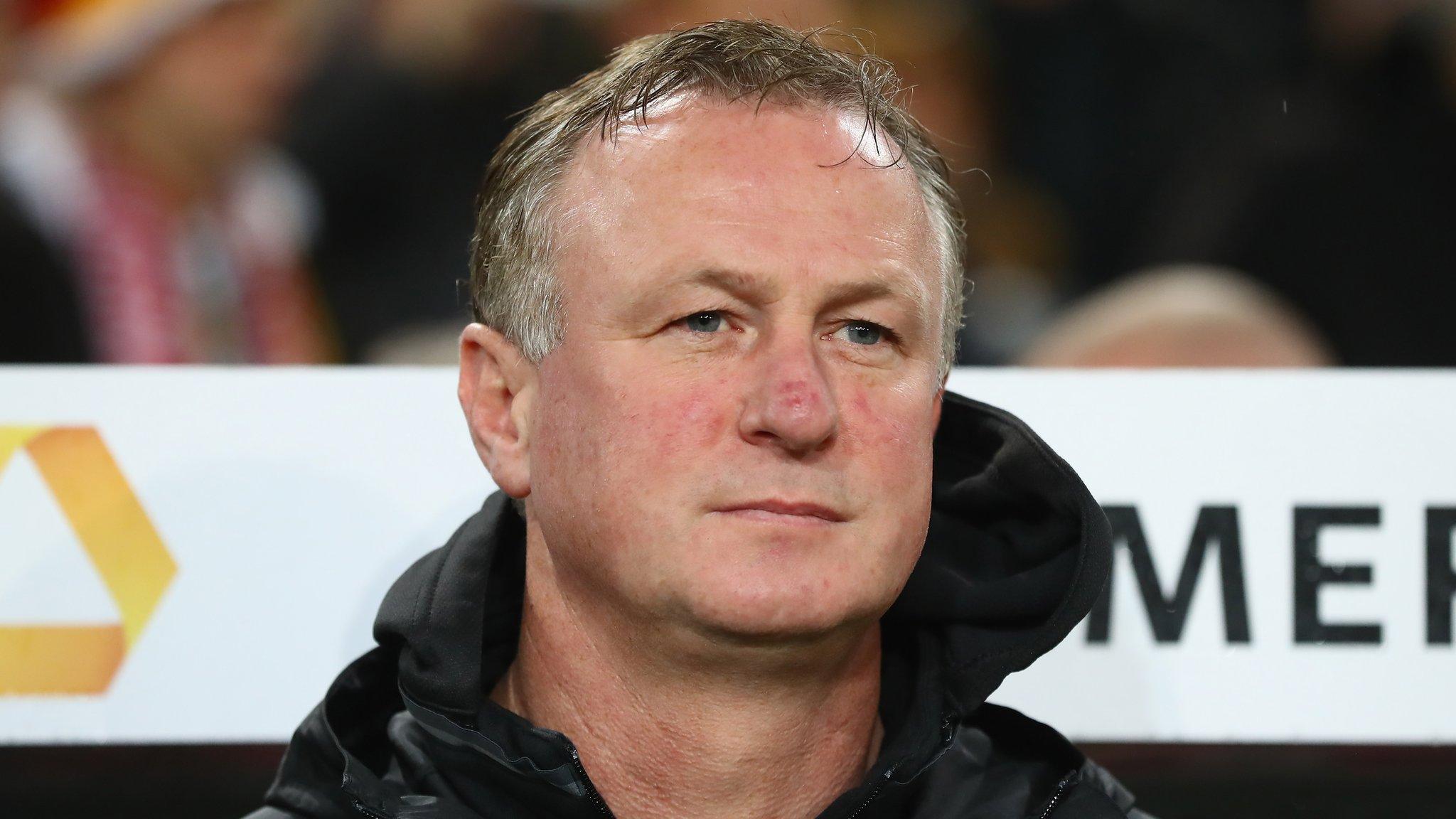
- Published6 January 2018
